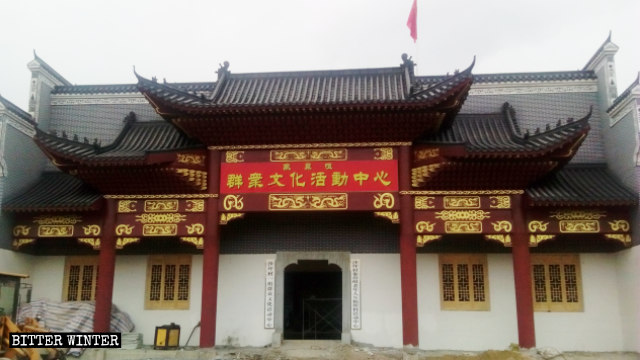Tongshan county government in Hubei Province is repurposing folk religion shrines, in which families have been paying respects to their ancestors for generations.
by Dai Quansheng
Just like during the Cultural Revolution, the current CCP’s campaign to suppress religion has extended from the five major denominations to folk religions.
Tongshan county under the jurisdiction of Xianning city in the central province of Hubei is home to 577 ancestral halls – shrines where people pay tribute and offer sacrifice to their ancestors. Treated as sacred, these halls are nurtured through generations and record the history and traditions of a family clan.
This year, following the adoption of two documents by the local authorities, at least 245 ancestral halls in the county were taken over by the state and repurposed for use other than paying respect to ancestors. The Implementation Plan for Comprehensive Advancement of the “Red Propaganda Project” in Tongshan County, issued by the county government, and the Implementation Plan for Special Rectification of Clan Ancestral Halls in Tongshan County, adopted by the county’s Civil Affairs Bureau, demand to convert ancestral halls into rural cultural activity centers.
“The focus is on introducing the core socialist values, China’s excellent traditional culture, and red culture into ancestral halls,” one of the edicts proclaims.
The county’s Civil Affairs Bureau also issued a document, entitled Precisely Rectify and Properly Convert Rural Ancestral Halls to Provide a Cultural Function
Similar campaigns to repurpose ancestral halls are underway in other regions. Some ancestral halls in Chongyang county, also under the jurisdiction of Xianning city, have been converted as well.
“Ancestral halls are part of feudal superstition,” a village official explained the reasons for such conversions. “Now, all ancestral halls and shrines must be transformed into cultural auditoriums, and Xi Jinping’s speeches must be posted in them.”
“Feudal superstition” is a pretext that the CCP often uses to crack down on religious beliefs, including folk religions. During the Cultural Revolution, numerous churches, temples, and ancestral halls were destroyed as part of the campaign to “eliminate feudal superstition and destroy the Four Olds: old customs, old culture, old habits, and old ideas.”“Let traditional rural ancestral halls jump out from the shadows of feudal backwardness and become a place to propagate advanced culture,” official reports describe the ongoing reforms.
As part of the campaign, people are also demanded to reduce the use of ancestral halls for clan gatherings, weddings or funerals, or for offering sacrifices to ancestors.
“Our understanding of ancestral halls is one of filial piety, which is a good thing and isn’t feudal superstition,” a villager surnamed Xu explained what ancestral halls mean to local people. “But national policies are what they are – there is nothing we can do about it.”
“If the government demands you to alter an ancestral hall, do you have any choice in the matter?” asked a local clan elder. “If you don’t, the state will tear it down.” Having lived through the Cultural Revolution, the elder still recalls how ancestral halls and genealogical records were destroyed.

For the CCP, engaging in any form of worship or contradicting the Party in the slightest means being labeled “dark and evil forces.”
“The government believes that having ancestral halls means ‘building up clan forces,’” another village official gave one more reason for the elimination of ancestral halls. “The state worries that if people form cliques, and clan forces grow, they could pose a threat to the regime.”
“Eliminating clan forces” is also a part of the nationwide campaign to “clean up gang crime and eliminate evil,” since the CCP believes that clans have already negatively affected grassroots-level government operations. Initiated in January 2018, the campaign supposedly targets organized crime, but in fact, it is also widely used to suppress people of faith.
“The government is afraid that people will get together and revolt,” a villager expressed his view bluntly. “If you do or say something that the authorities consider wrong, measures will be implemented against you.”
Source: Bitter Winter












